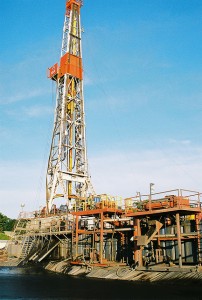By PAIGE HOUPT
Capital News Service
LANSING – House Democrats in Michigan are pushing bills to protect the state’s waters by regulating fracking, a process that injects water and chemicals deep into the ground to fracture rocks and force out natural gas.
They want further research on the practice’s environmental impacts.
The legislation would require full public disclosure of all fracking chemicals at least 30 days before fracking operations begin, according to Jeff Irwin, D-Ann Arbor, sponsor of one of the bills.
The bills would prohibit the state from issuing permits to drillers until further research on the environmental impacts.

A new package of bills in Michigan would add hurdles for natural gas drillers who use hydraulic fracturing. Photo: arimoore (Flickr)
Additionally, the departments of Environmental Quality and Natural Resources would study the public health, environmental and natural resource impacts.
The bills would also close the loophole on the exemption status for the natural gas industry, requiring them to comply with existing state water withdrawal regulations.
State and industry officials say that there are already sufficient safeguards, some of them just recently implemented.
But Irwin said oil and gas companies shouldn’t be allowed to drain nearby streams, rivers or neighboring wells for their financial benefit.
“The package would call on the Department of Environmental Quality to conduct a deep study of hydraulic fracking to make sure that these companies that look at Michigan with thirsty, hungry eyes, do everything they need to do, and they use best practices from around the country,” Irwin said.
Energy companies have used the fracking technology in Michigan since the 1960s. Industry representatives say it’s environmentally safe, but some lawmakers and environmental groups say it can pollute surface and groundwater and even air.
There are currently about 18,000 wells in the state, and 12,000 of them have been drilled for hydraulic fracturing, according to Hal Fitch, state director of the Office of Geological Survey.
Last year, Michigan auctioned off 120,000 acres of state land for hydraulic fracturing.
Cyndi Roper, director for Clean Water Action, said that water used for fracking, unlike water used for agriculture or other commercial needs, cannot be reused.
“We need to answer the questions we have on fracking and come back at it with a full set of answers in order to protect Michigan’s needs and in order to ensure we aren’t putting the state’s waters at risk,” Roper said.
The proposed legislation would allow Michigan to avoid chemicals leaking into groundwater as has happened in Texas, New York and Pennsylvania, according to Mike Berkowitz, Michigan chapter organizer from the Sierra Club.
“This will give our state an opportunity to learn more about this practice before making rash decisions,” Berkowitz said.
In May, the state set new regulations that will require operators to document where they plan to get the water they use.
They also will be required to report how much of the water they recover.
Companies also have to disclose the environmental effects of the chemical additives they use.
Operators are also required to submit records showing fracturing volumes, rates and pressures.
State officials say new legislation is unnecessary and that Michigan’s deep earth fracturing practices have been totally safe since the 1960s.
Industry officials agree.
“I think the best study we have is the experience of decades of experience,” said John Griffin, a Lansing lobbyist for the American Petroleum Institute.
“We have had quite a bit of activity but not quite as much as other states like Pennsylvania.”
Griffin said despite Michigan’s clean track record, there was one leakage incident in 1975, and as a result companies are required to use two layers of steel and two layers of cement within the fracking hole.
“But if you follow your regulations and have your two steel casings and two layers of cement then you’re not going to have a problem,” Griffin said
